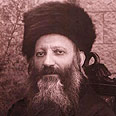
Only in Israel: Torah-only education
Throughout time, Judaism's great thinkers have integrated Torah studies with broad general education. It still works this way in Diaspora, so why not here?
Today, too, the haredi public abroad runs advanced educational institutes that integrate Jewish studies and secular studies, training their graduates to join the job market.
Only in Israel do less than 9% of haredim hold high school matriculation certificates or an academic degree. Some 65% of haredi men, who are supposed to be the breadwinners for their families, do not work.
How has the People of the Book, which has always been so proud of an education more extensive than other nations, become the People of One Book, in which ignorance and illiteracy prevails in so many fields necessary for dignified existence in the modern world?
A special investigative report published by Yedioth Ahronoth exposed the lie of general studies in the haredi education system. Not only do haredim miss out on basic subjects they must teach by law, the reports submitted by haredi inspectors to the Education Ministry are inaccurate (to say the least), such that haredi education institutes receive State budget for hours of classes that were never taught.
Yet, this is merely a side effect of a deepening disconnect between the haredi public and what the State of Israel has deemed to be part of the mandatory education of every citizen.
Even if their education has not always been a formal one, the rabbis that influenced Jewish thought were predominantly educated in secular subjects and had delved into broader fields of study beyond religious studies.
Rav Kook, for instance, was not hesitant, thanks to his broad knowledge, to explain that the theory of evolution does not contradict Judaism. Rabbi Yehuda Halevy, who was the king of Spain's doctor, wrote his philosophical treatise The Kuzari, considered one of the most important books of philosophy in Jewish history. Rabbi Menachem Mendel Schneerson, the rebbe of Lubavitch, audited philosophy courses in Berlin, had a degree in electrical engineering and enrolled for a degree in mathematics at the Sorbonne.
Other names, less well-known, but still within the bounds of some of Torah's great minds, are Rabbi Nehemia Anton Nobel, who was a doctor of philosophy, Rabbi Aharon Kaminka from Prague, who studied philosophy and political economy at universities throughout Europe, and Rabbi Don Yitzchak Abarbanel, who studied philosophy and science in the 15th century.
But in modern Israel? "In Israel, the rabbis have grown apart from education," said Prof. Menachem Friedman, who researches haredi society and links the phenomenon to the Holocaust. "After the most advanced and modern nations deteriorated so far so as to do the most monstrous thing of all, a clear trend indicating the assurgency of religion and the decline of academia can be seen. The rabbis today tell their students that everything can be learned from the Torah. There is no need to study astronomy, philosophy, mathematics."
Abroad, haredim got along just fine with religious and secular studies. Contrary to what one might presume, this does not happen because "in Israel it's easier to be a freeloader."
Yeshiva high schools
Prof. Amiram Gonen, who performed research comparing the haredi community in Israel with the haredi communities in the US and Britain, said, "I actually proved that a haredi in London can more easily live off of State funds than in Israel, but he doesn't do this. Two thirds of haredi men there work, versus just one third in Israel."Gonen added, "In the US, there is 'yeshiva high school,' high schools that combine a curriculum of secular and religious studies. They teach all the basic subjects. One of the most prominent examples of the integration between Torah studies and general education is Yeshiva University. Originally, it was a yeshiva, but the parents and students rebelled against the system. They said, 'Look what is happening. Our kids are studying in yeshiva and are coming out without a living.' So, in 1928, they turned it into a yeshiva-college, and later into Yeshiva University."
Most of the haredim in the US who belong to the Lithuanian stream of Judaism study in their own education institutions, which include extensive general studies. These institutions even prepare their students for the final examinations that all 18 year olds take, which allow them to continue on to higher academic studies or to find a job.
From the lower grades, a young Lithuanian haredi pupil in the US learns math, English, and science at a high level. Later, the haredi yeshivas serve as an American high school in every manner.
Prof. Gonen's study reveals that graduates from the haredi school system continue on to college, and from there to university. They become scientists, doctors, lawyers, businessmen, and other professionals. In contrast, a haredi high school graduate in Israel could only dream of such having such a profession.
Tzohar Chairman Rabbi Rafi Feuerstein, himself a graduate of psychology and philosophy at the Hebrew University, believes that a change must occur. "Even in the haredi public, which believes in a Torah state, they will ultimately have to provide answers to the question of where higher education will come from. Even in their system, a country needs doctors, engineers, and scientists," he said.
- Follow Ynetnews on Facebook










